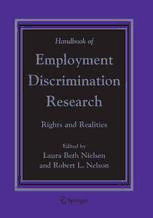
Handbook of Employment Discrimination Research: Rights and Realities PDF
Preview Handbook of Employment Discrimination Research: Rights and Realities
HANDBOOK OF EMPLOYMENT DISCRIMINATION RESEARCH HANDBOOK OF EMPLOYMENT DISCRIMINATION RESEARCH Rights and Realities Editedby LAURABETHNIELSEN and RRROBERTL.NELSON AmericanBarFoundationandNorthwesternUniversity ChicagoandEvanston,USA AC.I.P.CataloguerecordforthisbookisavailablefromtheLibraryofCongress. ISBN-101-4020-3370-2(HB) ISBN-13978-1-4020-3370-4(HB) ISBN-101-4020-3455-5(e-book) ISBN-13978-1-4020-3455-8(e-book) PublishedbySpringer P.O.Box17,3300AADordrecht,TheNetherlands. www.springeronline.com Printedonacid-freepaper AllRightsReserved (cid:1)C 2005Springer Nopartofthisworkmaybereproduced,storedinaretrievalsystem,ortransmitted inanyformorbyanymeans,electronic,mechanical,photocopying,microfilming,recording orotherwise,withoutwrittenpermissionfromthePublisher,withtheexception ofanymaterialsuppliedspecificallyforthepurposeofbeingentered andexecutedonacomputersystem,forexclusiveusebythepurchaserofthework. PrintedintheNetherlands. Thisbookisdedicatedtoourchildren Ben,Hannah,Ian,Skyler,Willy,andZach Table of Contents Acknowledgements xi Introduction xiii LauraBethNielsenandRobertL.Nelson SectionI Overview:Socio-LegalApproachestoAnti-DiscriminationLaw Chapter1 ScalingthePyramid:ASociolegalModelofEmployment DiscriminationLitigation 03 LauraBethNielsenandRobertL.Nelson Chapter2 Law’sRoleinAddressingComplexDiscrimination 35 SusanSturm Chapter3 WhatWeKnowAbouttheProblemoftheCentury:Lessonsfrom SocialSciencetotheLaw,andBack 59 SusanT.Fiske SectionII DebatingthePrevalenceandCharacterofDescrimination Chapter4 IncludingMechanismsinOurModelsofAscriptiveInequality 75 BarbaraF.Reskin Chapter5 UnderstandingtheSourcesofEthnicandRacialWageGapsand TheirImplicationsforPolicy 99 PPPedroCarneiro,JamesJ.HeckmanandDimitriyV.Masterov Chapter6 DiscriminationinConsummatedCarPurchases 137 IanAyres vii viii Chapter7 RacialEqualityWithoutEqualEmploymentOpportunity?Lessonsfrom aLaborMarketforProfessionalAthletes 149 WWWilliamBridges Chapter8 EmploymentDiscriminationBasedonSexualOrientation: DimensionsofDifference 167 KathleenE.Hull Chapter9 OccupationalMobilityAmongAfrican-Americans:Assimilation orResegregation 189 SharonM.Collins SectionIII ChangingBoundaries:HistoricalandSocialDevelopment ofAnti-DiscriminationLaw Chapter10 DiscriminationandDiplomacy:RecoveringtheFullerNationalStakein1960s CivilRightsReform 203 MaryL.Dudziak Chapter11 SowingtheDragon’sTeeth:MaterializationinLesbianandGay Anti-discriminationRights 219 JJJonathanGoldberg-Hiller Chapter12 RightsorQuotas?TheADAasaModelforDisabilityRights 237 KatharinaHeyer SectionIV MobilizingLaw:RightsConsciousness,ClaimingBehaviour, andtheDynamicsofLitigation Chapter13 TheEvolutionofEmploymentDiscriminationLawinthe1990s: APreliminaryEmpiricalInvestigation 261 JJJohnJ.DonohueIIIandPeterSiegelman ix Chapter14 PerceivingandClaimingDiscrimination 285 BrendaMajorandCherylR.Kaiser Chapter15 MobilizingEmploymentRightsintheWorkplace 301 CatherineR.Albiston Chapter16 TheIntersectionalityofLivedExperienceandAnti-Discrimination EmpiricalResearch 325 TanyaKater´Herna´´ndez Chapter17 LawatWork:TheEndogenousConstructionofCivilRights 337 LaurenEdelman Chapter18 DiscriminationAgainstCaregivers?GenderedFamilyResponsibilities, EmployerPractices,andWorkRewards 353 ErinL.Kelly SectionV SocialPsychologyofBias Chapter19 AversiveRacism:BiasWithoutIntention 377 SamuelL.Gaertner,JohnF.Dovidio,JasonNier,GordonHodson andMelissaA.Houlette Chapter20 ApplyingSocialResearchonStereotypingandCognitiveBiastoEmployment DiscriminationLitigation:TheCaseofAllegationsofSystematicGenderBias atWat-MartStores 395 WWWilliamT.Bielby References 409 AbouttheAuthors 451 Index 453 Acknowledgements Thiscollectionwouldnothavebeenpossiblewithouttheeffortsofmanyindividuals andthesupportoftheAmericanBarFoundation. The project began as a conference we organized, which was primarily funded by theAmericanBarFoundationwithhelpfromStanfordLawSchool.Thesuccessofthe conferenceitself,andthisvolume,isdueinlargeparttotheeffortsoftheconference planninggroup,whichconsistedofLawrenceBobo,JohnDonohueIII,LindaKrieger, LaurenEdelman,BarbaraReskin,PeterSiegelman,andClaudeSteele. For their participation at the conference and their inspiration in the study of an- tidiscrimination law, we also thank the conference participants: Kathryn Abrams, Catherine(KT)Albiston,IanAyres,MahzarinBanaji,WilliamBielby,JamesBoddy, WWWilliam Bridges, Thomas Burke, Pedro Carneiro, Bliss Cartwright, Ruth Colker, SharonCollins,TuckerCulbertson,KayDeaux,TheresaDemchak,JohnDonohueIII, Mary Dudziak, Lauren Edelman, Susan Fiske, Sam Gaertner, Jon Goldberg-Hiller, James Heckman, Tanya Hernandez, Katharina Heyer, Kathleen Hull, Cheryl Kaiser, Erin Kelly, Linda Krieger, Richard Lempert, Samuel Lucas, Glenn Loury, Brenda Major, Dmitriy Masterov, Michael McCann, Robert Nelson, Laura Beth Nielsen, DavidOppenheimer,BarbaraReskin,DeborahRhode,JohnRicca,PatriciaSchaeffer, BradSeligman,PeterSiegelman,ClaudeSteele,andSusanSturm. WewereassistedablybyEricBennett,AaronBeim,AdrieneHill,MiriamParrish, AnneGodden-Segard,andLucindaUnderwoodwiththeconferenceandintheprepa- rationofthemanusciptforpublication. This collection also represents the initial project of the Discrimination Research Group.TheDiscriminationResearchGroupisanefforttobringtogetherscholarsfrom avarietyofdisciplinestostudyemploymentdiscriminationandlawandissupported by the American Bar Foundation, the Center for Advanced Study in the Behavioral Sciences,andTheFordFoundation. xi Introduction This volume contains a collection of original papers by leading legal scholars and social scientists that develop new perspectives on anti-discrimination law, with an emphasis on employment discrimination. The articles were written for a conference heldatStanfordLawSchoolinSpring2003thatwassponsoredbytheAmericanBar Foundation and Stanford Law School. The purpose of that conference, this volume, andongoingworkbytheDiscriminationResearchGroupbasedattheAmericanBar FoundationandtheCenterforAdvancedStudyintheBehavioralSciencesistoadvance the social scientific understanding of employment discrimination and the operation of employment discrimination law as a social system, and to consider the legal and policyimplicationsofthisemergingbodyofsocialscience. Nowisapivotalmomentforanattemptatadeeperunderstandingofdiscrimina- tion and law. After three decades of theoretical development and empirical research onemploymentdiscriminationanditstreatmentinlaw,itiscrucialthatlawyers,social scientists,andpolicymakersassesswhatweknowanddonotknowaboutemployment discrimination and its treatment by law. To date, there are several streams of active research that only occasionally engage with each other. Economists and sociologists continue to debate the extent to which women, minorities, and other traditionally disadvantagedgroupsfacediscriminationinlabormarketsandorganizations.Organi- zationscholarsandlegalscholarshavebeguntomaptheeffectofanti-discrimination lawonorganizationalstructuresandprocesses,andtoraisequestionsabouttheextent towhichthelegalizationoforganizationalemploymentsystemsrepresentssymbolic or substantive changes in employment practices. Psychologists continue to develop andtesttheoriesaboutimplicitbiasandstereotypingbydecision-makersinorganiza- tions,aswellastheeffectsofdifferentialtreatmentongroupswhichmaybethetarget of such treatment. Students of social movements and social change analyze the rise ofrightsconsciousnessamongtraditionallydisadvantagedgroups,andthedegreeto wwhichpublicopinionissympathetictoremedialregimessuchasanti-discrimination lawandaffirmativeaction. Atthecenterofthesesocialscientificinquiriesisemploymentdiscriminationlaw, wwhich is itself a complex, changing, and incompletely understood social system. In the last decade, we have seen considerable expansion in the scope of formal statu- tory and judge-made rights—as discrimination based on age, disability, and sexual harassmenthavebeenaddedtolongerstandingprotectionsagainstracialandgender discrimination.Asaresult,therehasbeenaverysignificantgrowthinthenumberof complaintsfiledwiththeEEOCandinfederalcourts(filingstripledfrom8,000in1989 xiii
